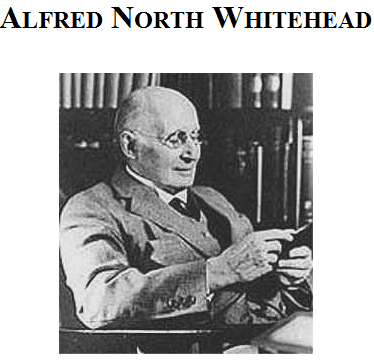

Occasions of experience of the fourth grade involve experience in the mode of presentational immediacy, which means more or less what are often called the qualia of subjective experience. The occasions of experience of the third grade involve living organisms. The occasions of experience of the second grade involve just inanimate matter. The first comprises processes in a physical vacuum such as the propagation of an electromagnetic wave or gravitational influence across empty space. The occasions of experience are of four grades. Whitehead uses the term 'actual occasion' to refer only to purely temporal actual entities, those other than God. He is objectified in each temporal actual entity but He is not an eternal object. He is objectively immortal, as well as being immanent in the world. The one exceptional actual entity is at once temporal and atemporal: God. An entity that people commonly think of as a simple concrete object, or that Aristotle would think of as a substance – a human being included – is in this ontology considered to be a composite of indefinitely many occasions of experience. This 'actual entity' idea is most distinctly characteristic of the metaphysics of Process and Reality, and requires of the newly approaching reader a philosophically unprejudiced approach. With one exception, all actual entities for Whitehead are temporal and are occasions of experience (which are not to be confused with consciousness, or with mere subjectivity). The actual entities are of two kinds, temporal and atemporal. Nothing "either in fact or in efficacy" underlies or lies beyond the actual entities rather they underlie all reality. Besides Aristotle's ontology of substances, another example of an ontology that posits actual entities is in Leibniz' monads, said to be 'windowless'.įor Whitehead, the actual entities exist as the only foundational elements of reality, the ultimately existing facts of the world. Whitehead chooses a way of defining the actual entities that makes them all alike, qua actual entities, with a single exception, God.įor example, for Aristotle, the actual entities were the substances, such as Socrates (a particular citizen of Athens) and Bucephalus (a particular horse belonging to Alexander the Great). Whitehead's most far-reaching and profound and radical contribution to metaphysics is his invention of a better way of choosing the actual entities. A further contributory singular cause of my being awoken by my alarm clock this morning was that I was lying asleep near it until it rang.Īn actual entity is a general philosophical term for an utterly determinate and completely concrete individual particular of the actually existing world or universe of changeable entities considered in terms of singular causality, about which categorical statements can be made. For Whitehead, there are many contributory singular causes for an event. Aristotle recognises singular causality as efficient causality. An example of nomic causation is that alarm clocks generally wake people in the morning. An example of singular causation is that I woke this morning because my alarm clock rang. This term may be contrasted with 'nomic causality'. It is manifest in what can be called 'singular causality'. Actual existence is a process of becoming, and “'becoming' is a creative advance into novelty”. The ultimate abstract principle of actual existence for Whitehead is creativity. The cosmology elaborated in Process and Reality posits an ontology based on the two kinds of existence of entity, that of actual entity and that of abstract entity or abstraction. Whitehead often speaks of the metaphysics of Process and Reality as 'the philosophy of organism'. The following is an attempt to provide an accessible outline of some of the main ideas in Whitehead's Process and Reality, based on the book itself, but guided by a general reading of secondary sources, especially I.

Whitehead's Process and Reality is perhaps his philosophical master work. Later he wrote extensively on physics and its philosophy, proposing a theory of gravity in Minkowski space as a logically possible alternative to Einstein's general theory of relativity. Educated as a mathematician, he became, through his coauthorship with his student and disciple Bertrand Russell and publication in 1913 of Principia Mathematica, a major logician.

Whitehead's background was an unusual one for a speculative philosopher.


 0 kommentar(er)
0 kommentar(er)
